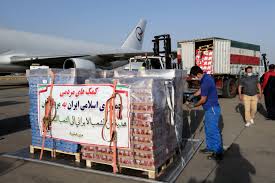There are no products in your shopping cart.
| 0 Items | £0.00 |


UNITED Nations officials have already delivered up to 20 tonnes of medical supplies to Lebanon in an emergency response to the bomb blast that ripped through its capital Beirut yesterday killing at least 135 people.
In one of the greatest ever incidents of criminal neglect, a mammoth stash of ammonium nitrate that was once described as a floating bomb had been left housed at the Beirut port since 2014 and it exploded yesterday. As recently as six months ago, officials inspecting the consignment warned that if it was not moved it would blow up all of Beirut.
As predicted, it went off yesterday, leaving 135 people dead according to the Lebanese Red Cross, with another 5,000 wounded. Up to 300,000 people suffered damage to their homes, leaving some uninhabitable an there are still a lot of people unaccounted for, meaning the death toll could end up being a lot higher.
Lebanon's prime minister Hassan Diab, blamed the explosion on 2,750 tonne store of ammonium nitrate, a chemical used in bombs and fertilisers that had been stored at the port. In 2014, a Russian-owned vessel carrying the cargo was impounded at Beirut’s port after making an emergency stop in the city and was subsequently denied permission to leave by customs authorities because it was deemed unseaworthy.
As a result, Igor Grechushkin, the owner of the ship abandoned it along with the crew, who it was claimed were being held hostage by Lebanese customs authorities. Consequently, the mostly Ukrainian crew were held onboard the ship for nearly a year before they were released and the ammonium nitrate was confiscated and held at the port in a warehouse.
Boris Prokoshev, the ship’s captain at the time of its detention, denied there were problems with the vessel, saying it was detained for failing to pay port fees. Also, the International Transport Workers Federation, which sought back wages and repatriation for the crew, confirmed that the ship was being held in part because it owed the port $100,000 in unpaid bills.
Badri Daher, the director-general of Lebanese Customs, said that in the years that followed, his agency had sent six documents to the judiciary warning that the material posed a danger. he said they requested that the cargo be re-exported but that did not happen.
Lebanon's economy minister, Raoul Nehme, said damage to the silos had left the country with less than a month’s grain reserves but claimed there was no risk of food shortage. Not taking any risks, the UN has immediately sent medical aid to the country with food supplies expected to follow shortly.
According to the World Health Organisation, an aircraft carrying the supplies has already landed in Beirut with enough equipment for 1,000 trauma interventions and 1,000 surgeries. The UN will now distribute the medical supplies to hospitals across Lebanon that have been receiving patients from Beirut, as three hospitals in the city are no longer functional and two were partially damaged by the explosion.
Yesterday's chemical accident came on top of civil unrest, an economic crisis, the coronavirus pandemic and Lebanon's burden of hosting nearly 900,000 Syrian refugees. Beirut's governor, Marwan Abboud, said damage from the blast extended over half of the city, with the cost of damage likely to be above $3bn.